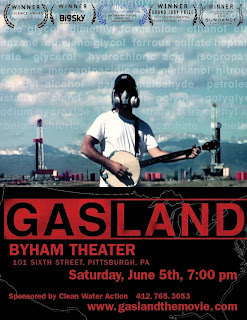As I have said before, indignation – as frustrating an emotion as it undoubtedly is – is a good feeling to have when watching a documentary. It means the thing is working. Josh Fox’s directorial debut, the Oscar-nominated GasLand, definitely left me with disbelief and anger in spades, and, in doing so it is an exceedingly effective protest documentary.
The film tells the story of bespectacled thirty-something Fox, a Pennsylvania forest-dweller thanks to his Thoreau-esque “hippy parents”, who is offered $100,000 by a natural-gas company to use his land for drilling. Intrigued and perplexed, he investigates the matter further and discovers that his house is above a shale that is one of the world’s largest natural gas deposits: a “sea of gas”. Further investigation leads him to discover that the process used to extract the water from the ground, known as hydraulic fracturing or “fracking”, has an execrable and toxic effect on the water table, people’s drinking water and the environment as a whole. Like the good, educated, middle-class crusader that he is, he decides the only logical next-step is to make a documentary film about the pernicious effects of fracking and natural gas extraction.
Fox at home
Facetiousness aside, the movie he makes is on a worthy subject and it’s an acutely revealing document. It shows how through the work of public enemy number one (or two, depending on your view) Dick Cheney, the former CEO of Halliburton (one of the largest gas companies) and lobbyists, Congress passed a bill exempting natural gas and oil companies’ from the Safe Drinking Water Act of the 1970s. Therefore, those companies have been free to pollute people’s water with carcinogens and other deadly chemicals, such as benzene. This mix of gas and the fracking liquid has caused not only tap water – yes, good ole H2O – to be flammable, but also severe health problems, such as brain damage, in people who live near drill sites.
Not fit for tooth-brushing
Surreal shots of flammable water and ruined landscapes form just a small part of the impressive imagery on show in GasLand. The sheer poetry of the bucolic images of the forest and the plains, combined with Fox’s banjo playing, was impressive: a welcome antidote to the usual Inside Job-style barrage of charts and gaudy graphs. The director’s sub-Terence Davies gravelly voice-over work was occasionally annoying, but did spin a poetic line or two every so often, adding to the homespun and likeable tone of the doc.
Better than the eventual winner, Inside job, this is a brilliant, if 15 minutes over-long, film in a year of great documentaries. With the possibility of fracking hitting European shores soon, it is essential viewing.















